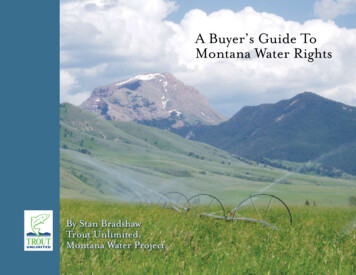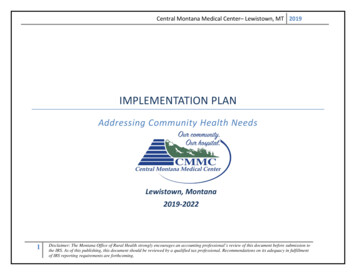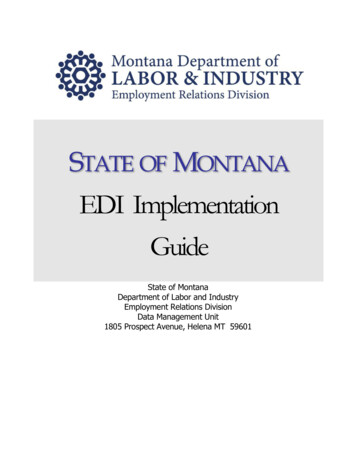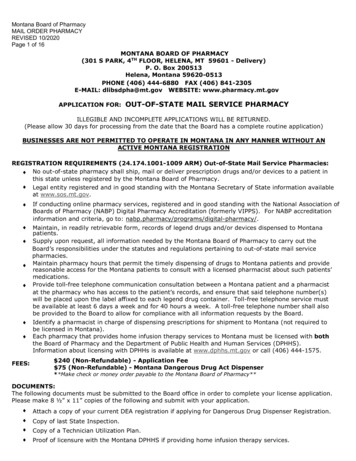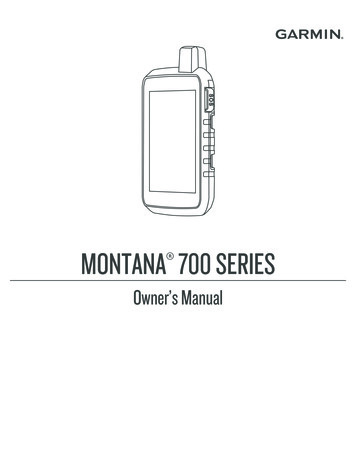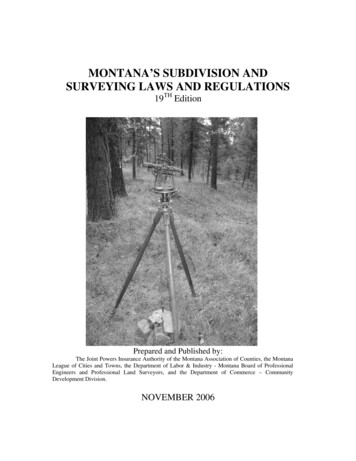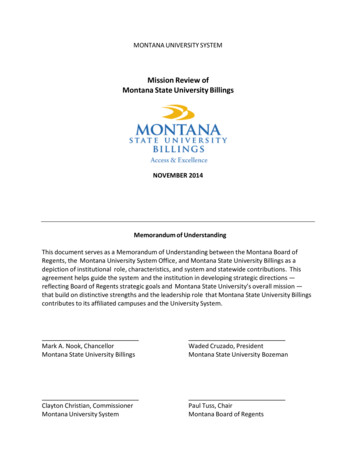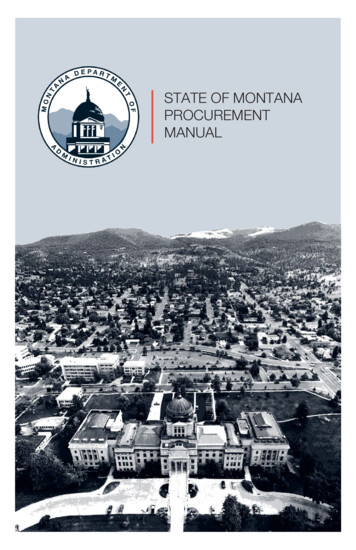
Transcription
STATE OF MONTANAPROCUREMENTMANUAL
TABLE OF CONTENTSChaptersNUMBERTITLEChapter 1Chapter 2Chapter 3Chapter 4Chapter 5Chapter 6Chapter 7Chapter 8Chapter 9Chapter 10Chapter 11Chapter 12Chapter 13IntroductionStatutes, Rules, and PoliciesDelegated AuthorityEthics Laws, and Professional StandardsVendor CommunicationThe Procurement CycleProcurement PlanningProcurement Method IdentificationSource SelectionContract Formation and AwardContract ManagementP-Card ProgramFuel Card ProgramAppendicesNUMBERTITLE1Glossary of Procurement TermsAbbreviationsDark Money Disclosure TemplateSample Freedom of Information (FOIA) RequestAgency Compliance Review Program, and Delegation Agreement ProcessAgency Self-Reporting Template (Reserved)Declaration of Non-Conflict of Interest and Confidential Information TemplateState of Montana Ethics PolicyNon-Disclosure and Conflict of Interest CertificationAcquisition Plan (Sample)Guideline for Statements of WorkStatement of Work TemplateRequest for Information (RFI) TemplateEvaluation Criteria and Scoring StrategiesStandard Terms and Conditions (RFP)Standard Terms and Conditions (IFB)Requisition TemplateRESERVEDPre-Bid/Proposal Conference GuidelinesQ&A Document (Sample)Solicitation Amendment (Sample)Purchase Order TemplateLimited Solicitation Template - Oral QuotesLimited Solicitation Template - Written QuotesInvitation for Bid (IFB) Template2345678910111213141516171819202122232425
State of Montana Procurement ManualBack to Table of ContentsAppendicesNUMBERTITLE26The Request for Proposal (RFP) ProcessRequest for Proposal (RFP) Process Qs & AsRequest for Proposal (RFP) ManualRequest for Proposal (RFP) Check-Off ListRequest for Proposal (RFP) TemplateTier II Solicitation ProcedureContractor Engagement Proposal (CEP) ChecklistContractor Engagement Proposal (CEP) Coversheet and Proposal InstructionsContractor Engagement Proposal (CEP) Evaluation CriteriaContractor Engagement Proposal (CEP) Scoring MatrixContractor Engagement Proposal (CEP) Position Description TemplateContractor Engagement Proposal (CEP) Position Description ExampleSole-Source/Sole Brand JustificationSoftware as a Service (SaaS) Agreement TemplateSoftware License Agreement TemplateTier II Solicitation ProcessTier II Coversheet and InstructionsStatement of Work Task Order (Sample)Tier II Evaluation Criteria OutlineScoring MatrixTier II Solicitation ChecklistLease Finance Master AgreementLease Finance SchedulesRESERVEDGuide for Identifying and Handling Confidential InformationTrade Secret Confidentiality AffidavitNepotism Disclosure Statement for Procurement PersonnelEvaluation Committee GuidelinesSample Scoring GuideEvaluation Committee Member Scoring Matrix (Sample)Reference Check Form (Sample)RESERVEDRequest for Documents NoticeVerification of License of Surety CompanyContract Template1% Contractor’s Gross Receipts Contract Award Registration Form (CGR-1)Post-Award Conference Agenda (Sample)Complaint Form Regarding State Contractors1% Contractor’s Gross Receipts Gross Receipts Withholding Return (CGR-2)Novation Assignment Agreement (Sample)Notice of Termination for Convenience (Sample)Notice of Termination for Cause (Sample)Cure Notice (Sample)Show-Cause (Sample)Contract Close-Out 505152535455565758596061626364656667686970pg. i-3
State of Montana Procurement ManualBack to Table of ContentsTablesNUMBERTITLE4.1Consanguinity and Affinity Relationship Chart for Public Official or Employee7.1Procurement Administrative Leadtime (PALT) Chart11.111.2Master File Checklist (Sample)Common Carrier Shipping Methodspg. i-4
State of Montana Procurement ManualBack to Table of ContentsCHAPTER 1INTRODUCTIONThe State Procurement Bureau (SPB), within the Montana State Financial Services Division (SFSD),provides professional procurement services and resources to Montana State agencies. This Manual, one ofthose resources, is produced to: aid public Contracts Officers (COs) in the execution of their duties, provide a framework for procurement processes and best practices, and provide the public with an overview of the processes, procedures, laws, regulations, and policiesthat control the expenditure of public funds.Although this Manual serves as a reference manual for implementing the requirements of the State ofMontana procurement laws, it is not an exhaustive compilation of every Statute, Rule, and standard thatmay pertain to a particular transaction. Furthermore, this Manual is not a manual on the law of contracts,nor does it constitute legal advice; the content is restricted to describing activities related to the phases ofthe Procurement Cycle discussed in Chapter 6.The Glossary of Procurement Terms and list of selected Abbreviations are within Appendices 1 and 2,respectively.pg. 1-1Introduction
State of Montana Procurement ManualBack to Table of ContentsCHAPTER 2STATUTES, RULES, AND POLICIES2.1Authority. This Manual is issued under the authority of Montana Code Annotated 2017 (MCA),Title 18, Public Contracts, and Title 28, Contracts and Other Obligations, and focuses on theimplementation of these Statutes as well as Title 2, Chapter 5, State Procurement, of theAdministrative Rules of Montana (ARM).2.1.1Exceptions. This Manual does not apply to the expenditures exempted by 18-4-132, MCA.2.1.2Executive Orders.2.1.2.1 Dark Money. Montana Executive Order #15-2018, Executive Order RequiringDisclosure of Dark Money Spending for Entities Doing Business with the State ofMontana, requires agencies to collect Dark Money spending disclosures fromVendors responding to solicitations with a Total Contract Value (TCV) exceedingcertain thresholds (i.e., 25K for services and 50K for supplies). The “DarkMoney Disclosure Template” at Appendix 3 is used for reporting applicable DarkMoney contributions. The DM Disclosure is available within the State’s electronicprocurement system (eMACS) and the State Procurement Bureau’s (SPB) websiteat:http://spb.mt.gov/Laws-Rules2.1.2.2 Executive Order 6-2018, Internet Neutrality Principles in State Procurement,requires recipients of State contracts to adhere to internet neutrality principles.2.1.2.3 Executive Order 12-2016, Promoting Equal Pay for Montana Women, incentivizesrecipients of State contracts to engage in best practices to promote wagetransparency.2.1.2.4 Executive Order 4-2016, Prohibiting Discrimination in State Employment andContracts, requires all State hiring to be merit- and qualifications based, and freefrom discrimination based on any of the classes of constituents within theExecutive Order.2.2Public Access to Documents.2.2.1pg. 2-1Freedom of Information Act (FOIA). Both the Montana State Constitution (Article II, PartII, Sections 8 through 10) and the Montana Public Records Act (Montana Code 2-6-101,et seq.) give the public the right to examine and request public records of governmentbodies at all levels. The definition of records includes all writings of government bodies,electronic mail, and items in "electronic format or other non-print media, including but notlimited to videotapes, photographs, microfilm, film, or computer disk." There is norequirement for a statement of purpose, but the law does place a limit on the sale of mailinglists for commercial reasons. (There are also no time limits specified for the State torespond to a request.) Public documents are provided to the public through the State’sofficial website (Montana.gov) and through Freedom of Information Act (FOIA) requestsfiled with the State. Appendix 4 provides a sample FOIA request.Statutes, Rules, and Policies
Back to Table of Contents2.2.2pg. 2-2State of Montana Procurement ManualProcurement-Related Documents and Records. In addition to general State and Agencyinformation, the public has 24-hour access to procurement-related forms, templates andinformation through the State Financial Services Division (SFSD) website at:http://spb.mt.gov. In addition, the Montana Procurement Act, and the Administrative Rulesgoverning State procurement are posted at: http://spb.mt.gov/Laws-Rules.Information not readily available on the website may be requested through a FOIA requestto the Agency/ies responsible for the document(s)/information needed.Statutes, Rules, and Policies
State of Montana Procurement ManualBack to Table of ContentsCHAPTER 3DELEGATED AUTHORITY3.1Delegation Agreements.3.1.1Overview. The authority to procure supplies and services needed by the State is conferredupon the Department of Administration by 18-4-221, MCA. The Division then delegatesportions of its authority to State agencies through what are called Delegation Agreements.Delegation agreements are issued on a case-by-case basis through an SPB ComplianceReview- and Delegation process, although SPB may issue general rules for classes ofprocurements, such as particular procurement types (e.g., emergency purchases) or contractvalues (e.g., one-time purchase of supplies that does not exceed 50K).3.1.2Requirement for Competition. Delegation agreements require State purchases to be madethrough competitive processes. When that is impractical or impossible, State-mandatedprocedures ensure these purchases are appropriate, transparent, and infrequent.3.1.3Agreement Term. Delegation agreements have two-year terms, beginning January 1st (ofeven-numbered years) through December 31st (of the following odd-numbered years). Theamount and type of authority delegated to an agency is based on:Agency performance history (as defined in the delegation agreement);Staff training accomplishments;Agency resource availability to meet level of requested authority;The expertise of the agency CO and procurement staff in terms of specializedknowledge pertinent to the authority to be delegated; The degree of economy and efficiency to be achieved in meeting the State'srequirements if authority is delegated; and Consistency of authority delegated under similar circumstances. pg. 3-13.1.4Level One Delegation Authority. Agencies with Level One authority purchase (noncontrolled) services and supplies with a TCV of not more than 25K and 50K respectively.In addition to payment contracts pursuant to 18-4-132, MCA, this includes revenuegenerating contracts and/or contracts that involve no cost to the State. Each agency’sProcurement Officer (APO) oversees that agency’s compliance with its DelegationAgreement, the Montana Procurement Act, and Division Montana Operations Manual(MOM) policies. (Note: Agencies may not artificially divide purchases into small- lotpurchases to stay under Delegation Agreement dollar thresholds.) Should an agency fail tocomply with procurement laws, or rules under its delegated purchasing authority, thatauthority may be revoked.3.1.5Level Two Delegation Authority. Agencies with Level Two authority purchase (noncontrolled) services and supplies with a TCV of not more than 100K. This also includescontracts that are revenue-generating or at no cost to the State, in addition to paymentscontracts pursuant to 18-4-132, MCA.Delegated Authority
Back to Table of Contents3.1.63.2State of Montana Procurement ManualWhen Delegation is Unnecessary. Delegations and competitive procedures are not requiredfor: Pastoral services; Training services; Training- and Conference space rental and catering; Fresh fruit and vegetables, and food products produced in Montana, subject to theprovisions of 18-4-132, MCA; Advertising services (time on air, etc.) (the development, design, and distributionof the advertising are not included in this exception); Educational instructors and Guidance Counselors for inmates; Books and Periodicals; and Purchases from Sheltered Workshops.Agency Compliance Review Program. To ensure there is no State agency, program, or rule that isunresponsive to the needs of the people of the State, MCA 2-8-101 requires State agencies toperform periodic self-evaluations, and to provide the results of those reviews to the State.Montana’s Agency Compliance Review Program supports this Statutory requirement, and consistsof agency Annual Self-Reporting, On-Site Compliance Reviews, and Corrective Action Plans. TheGraphic at Appendix 5 shows the Agency Compliance Review Program, and DelegationAgreement Process.3.2.1Annual Agency Self-Reporting. Agencies perform self-reporting through a survey link,where agencies respond to questions and upload required reports. The following are alsopart of the self-reporting requirement: Annual Contract Report; Purchases exceeding agency delegated authority; A report of current agency procurement staff and contract managers showingcompliance with required training; A copy of the agency’s procurement policies, procedures, and Manual; and Additional reports required.The Agency Self-Reporting Template is being revised; when it has been updated, it will belocated at Appendix 6.pg. 3-23.2.2On-Site Compliance Reviews. SPB conducts on-site Compliance Reviews at each agencya minimum of every three years, at the end of which it issues a Summary Report to theagency, annotating corrective action required.3.2.3Corrective Action Plans. Corrective Action Plans include timelines for implementation ofthe corrective measures. Failure of an agency to implement its Corrective Action Plan mayresult in the suspension- or termination of its Delegation Agreement.Delegated Authority
State of Montana Procurement ManualBack to Table of ContentsCHAPTER 4ETHICS LAWS, AND PROFESSIONAL STANDARDS4.1Overview. Ethical behavior and integrity are fundamental tenets of public procurement, derivedfrom values like fairness, honesty, and accountability. COs are the gatekeepers for the expenditureof the State’s limited financial resources, entrusted to uphold the highest ethical standards and begood stewards of public funds with every purchasing decision. Any erosion of public trust, and anyperception of impropriety, is detrimental to the integrity of the procurement process; therefore, allState employees involved in procurement activities behave ethically, impartially, andprofessionally; each State employee involved with public procurements completes and submits aDeclaration of Non-Conflict of Interest and Confidential Information form to the State. A Templateis located at Appendix 7. Information for employees regarding Standards of Conduct is on-line at:http://hr.mt.gov/newresources4.1.1Nepotism. Nepotism is a form of conflict of interest that involves an explicit act of usingone’s position to favor a relative. It is the bestowal of political patronage by reason ofrelationship rather than of merit. Montana Code 2-2-304, Penalty for violation of nepotismlaw, in short, makes it unlawful to be involved in the appointment of any person related byconsanguinity (blood) within the fourth degree or by affinity (marriage) within the seconddegree. A relationship by consanguinity is one established through bloodlines. Theconsanguinity relationship may be either lineal (persons in a direct line of descent)or collateral (persons not in a common line of descent but with a commonancestor). A relationship by affinity arises by virtue of marriage. A relationship by affinityexists between an individual and either the blood relatives of the individual’sspouse or the spouses of the individual’s blood relatives. (If at least two marriagesare required to establish a link between two persons, they are not related byaffinity.)There are different ways of computing degrees of relationship. Montana law computesdegrees of relationship by the civil law method. The table at 4.1 provides descriptions ofthe consanguinity and affinity relationships that may be referenced in the various nepotismlaws which prohibit certain types of activities based on an employee’s job responsibilities,employment within a branch of State, or employment by a particular agency.pg. 4-1Ethics Laws and Professional Standards
State of Montana Procurement ManualBack to Table of ContentsTABLE 4.14.24.1.2Appearance of Impropriety. The root of ethical behavior in public procurement is thecommitment of State personnel to neither gain personally from, nor unduly favor anyonein the execution of their official duties. They are guided by a duty to serve the public, forwhom they are employed, and therefore not only comply with the minimum legal standardsof ethical conduct established by statutes, agency rules and policies, and professionalcertifications, but conduct themselves in a manner that avoids even the appearance ofimpropriety.4.1.3Resolving Ethical Dilemmas. This Manual does not contain a comprehensive list of everystatute, agency rule, agency policy, or professional code of conduct that may apply toprocurement activities; it does provide guidance on the most commonly applicable ethicslaws and professional standards. The State of Montana expects each public employee tocomply with all legal requirements, use sound reasoning and best judgment, and actethically and with integrity. When faced with an ethical dilemma, staff seek assistimmediately from a supervisor, Legal Counsel, the State Procurement Bureau, or ethicsofficer.4.1.4Certain Employment Restrictions and Disclosure Statements. The State of Montana EthicsPolicy (Appendix 8) identifies standards by which State employees conduct themselves,in addition to the Conflict of Interest restrictions, employment restrictions, and requireddisclosures applicable to public procurement personnel. Personnel involved in aprocurement certify their compliance with Title 2, Chapter 2 of the MCA, Standards ofConduct, by completing the Non-Disclosure and Conflict of Interest Certification, aTemplate for which is at Appendix 9.State Ethics Policy. The Montana State Legislature enacted statutes that detail the ethicalresponsibilities and disclosure obligations of State officers and employees. These Statutes forbidState officers and employees from: having any financial (or other) interest, engaging in a business transaction or professional activity, or incurring an obligationof any kind that is in substantial conflict with the proper discharge of duties in the public interest.pg. 4-2Ethics Laws and Professional Standards
Back to Table of Contents4.3State of Montana Procurement ManualState Ethics Policy/Standards of Conduct. The Legislature also established standards of conductfor State officers and employees that do not allow State officers or employees to: Accept or solicit any gift, favor, or service that might influence the officer or employee inthe discharge of official duties, or that the officer or employee knows or should know isbeing offered with the intent to influence the officer or employee’s official conduct; Accept other employment, or engage in a business or professional activity, that the officeror employee might expect would require or induce the officer or employee to discloseconfidential information acquired by reason of the official position; Accept other employment, or compensation, that could impair the officer or employee’sindependence of judgment in the performance of the officer or employee’s official duties; Make personal investments that could create a substantial conflict between the officer oremployee’s private interest and the public interest; or Intentionally or knowingly solicit, accept, or agree to accept any benefit for havingexercised the officer or employee’s official powers or performed the officer or employee’sofficial duties in favor of another.State employees who violate the State Ethics Policy or their agency’s ethics policy are subject totermination or other employment-related sanction, and civil or criminal penalty if warranted.Agencies cannot use appropriated funds to compensate State employees who violate the StateEthics Policy.4.4Bribery. Bribery is a criminal offense that occurs when a person intentionally or knowingly offers,confers, or agrees to confer on another (or solicits, accepts, or agrees to accept) any benefit(including a salary) as consideration for a violation of a public servant’s legal duty or a publicservant’s decision, opinion, recommendation, vote, or any other exercise of discretion. A Stateemployee is subject to criminal prosecution if the employee accepts employment as considerationfor an official act. A bribery offense occurs even if the benefit is offered after the employee hasacted in a manner desired, or after the employee has ceased working for the State.4.5Gifts to Public Servants.pg. 4-34.5.1Prohibited Activities. It is a criminal offense for a public servant to accept a benefit from aDonor subject to the public servant’s jurisdiction. It is also an offense for a public servantwho exercises discretion in connection with (contracts, purchases, payments, claims, orother) State pecuniary transactions to solicit, accept, or agree to accept any benefit fromany person or entity whom the public servant knows is interested in, or likely to becomeinterested in, any contract, purchase, payment, claim, or transaction involving the exerciseof the public servant’s discretion. Acceptance of a gift may also be prohibited if the Donoris a registered lobbyist.4.5.2Allowable Activities. Not all gifts are prohibited; Promotional and commemorative itemsof minimal value, such as: caps, coffee mugs, T-shirts, key rings, and discount coupons, donot constitute an improper benefit if they are not solicited, and are not offered or acceptedin exchange for any action or inaction on the part of a public servant. It is also permissiblefor an employee to accept a gift from a friend, relative, or business associate with whomthe employee has a relationship independent of the employee’s official status, provided thegift is given on account of the personal relationship and not because of the official status.(State employees may generally accept non-cash items with a value of less than fifty dollars( 50) if approved by Legal Counsel.)Ethics Laws and Professional Standards
State of Montana Procurement ManualBack to Table of Contents4.6Misuse of Official Information. As a result of employment with the State of Montana, employeeshave access to information the public does not. State employees face criminal liability by takinginformation that is not public, and that was obtained during the performance of official duties andusing it for a private purpose. The phrase “information that is not public” means any informationto which the public does not have access, and that is prohibited from disclosure under the MontanaPublic Records Act. A public servant commits an offense if, by relying on non-public information,the person: Acquires, or aids another to acquire, a pecuniary interest in any property, transaction,or enterprise that may be affected by the information, Speculates, or aids another to speculate, on the basis of the information, or As a public servant, coerces another into suppressing (or failing to report) thatinformation to a law enforcement agency.A public servant also commits an offense if, with intent to obtain a benefit or to harm or defraudanother, the servant knowingly discloses or uses undisclosed, non-public information for a nongovernmental purpose.4.7Misuse of State Property. State law prohibits the misuse of State resources, including computers,copiers, supplies, and staff time. A public servant commits an offense if, with intent to obtain abenefit or to harm or defraud another, the servant intentionally or knowingly misuses anything ofvalue belonging to the State that has come into the servant’s custody or possession by virtue of theservant’s office or employment. A public servant faces criminal prosecution for use of a Stateissued credit card for a (personal) expenditure that is not authorized.4.8Suspected Fraud, Waste, or Abuse.4.8.1Purchasing Accountability and Risk Analysis Procedure. The Montana Legislative AuditDivision (LAD) investigates allegations of fraud, waste, and abuse. Each agency developsand follows a Purchasing Accountability and Risk Analysis Procedure that includes anassessment of the risk of fraud, abuse, and waste taking place in its: contracting processes; contract provisions; and payment and reimbursement rates and methods.4.8.2Reportable Activities. Administrative heads of agencies who have reasonable cause tobelieve that money is being lost, misappropriated, or misused, or who become aware offraudulent or unlawful conduct report this information to the LAD. A “reasonable causeto believe” exists when a set of facts would lead a reasonable and prudent person to believethat an offense may have been or will be committed. Employees and Contractors whobecome aware situations that involve suspicious activities or fraudulent acts report theconcerns to LAD. The LAD coordinates investigatory work with internal auditors, federaland State prosecutors, and law enforcement agencies at the city-, county-, State-, andfederal levels. Criminal offenses investigated by LAD include, but are not limited to: pg. 4-4theft;forgery;tampering with a State record;securing execution of document by deception;misapplication of fiduciary property;conversion of funds;Ethics Laws and Professional Standards
Back to Table of ContentsState of Montana Procurement Manual abuse of official capacity; gift to a public servant by a person subject to his or her jurisdiction; and bribery.Reports of fraud, waste, and abuse involving State resources may be submittedanonymously via the following:On-Line at: https://leg.mt.gov/lad/fraud-hotlineBy electronic mail to: LADHotline@mt.govBy telephone at 800-222-44464.9pg. 4-5Reporting of Anti-Competitive Practices. In accordance with MCA 2017, 18-4-314, if for anyreason collusion or other anti-competitive practices are suspected among Vendors, a notice of therelevant facts shall be transmitted to the Attorney General by the Department.Ethics Laws and Professional Standards
State of Montana Procurement ManualBack to Table of ContentsCHAPTER 5VENDOR COMMUNICATION5.1Overview. Communication between the State and Vendors is encouraged, and often imperative. Ifused effectively, communication with industry is a vital resource for Contracts Officers (COs). Toensure a fair opportunity for eligible Vendors to compete for State work, and to avoid anyappearance of favoritism, one-on-one communications with Vendors during competitiveprocurements are subject to enhanced scrutiny. Legal Counsel is consulted when there is any doubtabout the appropriateness of communications with Vendors.5.2Fact-Gathering. Vendors are often experts in their respective fields, offering insights into potentialpurchases, such as trends, industry practices, products, and solutions. Montana law authorizes theexchange of information between an agencies and Vendors related to requirements andsolicitations. As part of the Acquisition Planning process, the CO and procurement team develop aplan to obtain needed Vendor input, which may include issuance of a Request for Information (anRFI), industry days, and contacting industry leaders and Vendors prior to a solicitation. Theseinteractions lead to more detailed, up-to-date technical requirements, scopes of work, and costestimates, resulting in increased competition and a better value for the State.5.3Drafting the Solicitation. To ensure the integrity of the procurement process, all communicationswith Vendors cease when solicitation drafting has begun. When a Vendor provides assistance indrafting requirements documents, it is ineligible for award of the resulting contract.5.4During the Solicitation. From the date the Request for Proposal (RFP)/Invitation for Bid (IFB) isissued and until a Contractor is selected, there are no off-the-record communications regarding theprocurement except at the direction of the CO. Unauthorized contact may disqualify a Vendor fromaward consideration.5.4.1Single Point-of-Contact (POC). All questions, issues, and clarifications go through the CO,the single POC for the solicitation and sole authority for interacting with potentialofferors/bidders. The purpose of naming a single POC is to: pg. 5-1ensure questions are routed through one person;eliminate confusion by providing the same information to all interested parties(general public, agencies, and offerors); andinform potential offerors that they may not contact members of the evaluationcommittee or agency staff.5.4.2Question and Answer (Q&A) Process. When issuing solicitations, agencies generallyinclude a Q&A process to allow for Vendor comments and questions. Failure to do so oftenresults in either higher costs to the agency as a result of undiscovered errors, or unclearspecifications (causing Vendors to bid high to cover unforeseen costs), or requirementsbeing delayed or unmet because Vendors failed to respond to the solicitation at all.5.4.3Sharing Information During Evaluation Phase. Proposal evaluation and Contractorselection is based solely on the proposals submitted, and presentations held by each Vendorwithin the confines of the solicitation requirements, not other communications. When oneVendor is provided an opportunity to clarify its proposal, similarly situated Vendorsreceive the same opportunity. The only Vendor-CO interactions that will take place will beVendor Communication
State of Montana Procurement ManualBack to Table of Contentsfor the purposes of: clarifying an Offeror’s ability to meet the solicitation requirements; negotiating, including a request for Best and Final Offer (BAFO); and exchanging information to facilitate a potential contract award.pg. 5-2Vendor Communication
State of Montana Procurement ManualBack to Table of ContentsCHAPTER 6THE PROCUREMENT CYCLEBefore engaging in public procurement activities, it is important to understand that there are commoncharacteristics between procurements, and that following each of the processes outlined in this Manualensures procurements are conducted in a transparent and efficient manner. The steps of the ProcurementCycle are generally
54 Sample Scoring Guide 55 Evaluation Committee Member Scoring Matrix (Sample) 56 Reference Check Form (Sample) . photographs, microfilm, film, or computer disk." There is no requirement for a statement of purpose, but the law does place a limit on the sale of mailing . Books



